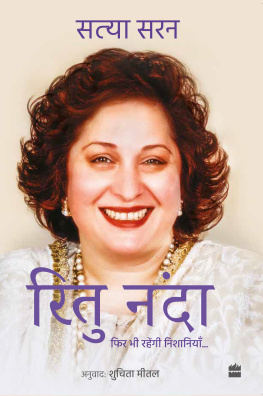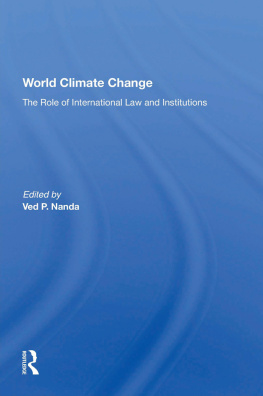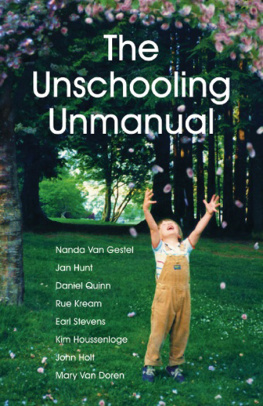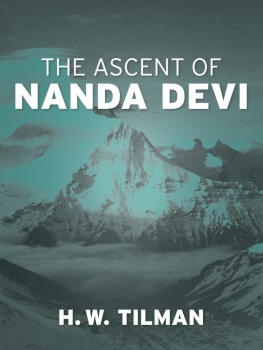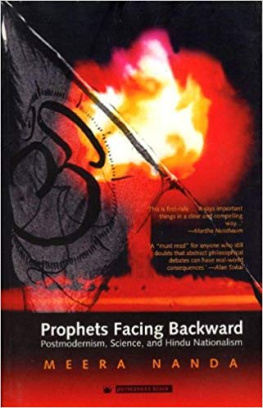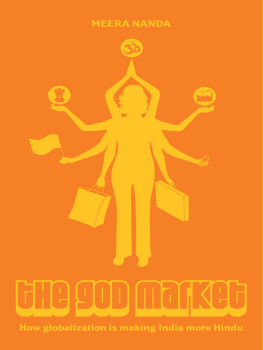Nanda - The God Market
Here you can read online Nanda - The God Market full text of the book (entire story) in english for free. Download pdf and epub, get meaning, cover and reviews about this ebook. year: 2011, publisher: Monthly Review Press, genre: Politics. Description of the work, (preface) as well as reviews are available. Best literature library LitArk.com created for fans of good reading and offers a wide selection of genres:
Romance novel
Science fiction
Adventure
Detective
Science
History
Home and family
Prose
Art
Politics
Computer
Non-fiction
Religion
Business
Children
Humor
Choose a favorite category and find really read worthwhile books. Enjoy immersion in the world of imagination, feel the emotions of the characters or learn something new for yourself, make an fascinating discovery.

The God Market: summary, description and annotation
We offer to read an annotation, description, summary or preface (depends on what the author of the book "The God Market" wrote himself). If you haven't found the necessary information about the book — write in the comments, we will try to find it.
The God Market — read online for free the complete book (whole text) full work
Below is the text of the book, divided by pages. System saving the place of the last page read, allows you to conveniently read the book "The God Market" online for free, without having to search again every time where you left off. Put a bookmark, and you can go to the page where you finished reading at any time.
Font size:
Interval:
Bookmark:
Thank you for buying this ebook, published by NYU Press.
Sign up for our e-newsletters to receive information about forthcoming books, special discounts, and more!
Sign Up!
A publisher of original scholarship since its founding in 1916, New York University Press Produces more than 100 new books each year, with a backlist of 3,000 titles in print. Working across the humanities and social sciences, NYU Press has award-winning lists in sociology, law, cultural and American studies, religion, American history, anthropology, politics, criminology, media and communication, literary studies, and psychology.
THE GOD MARKET
How Globalization is Making India more Hindu
by MEERA NANDA

Copyright 2009, 2011 by Meera Nanda
All rights reserved
Originally published as The God Market
by Random House Publishers India Private Limited, 2009
Library of Congress Cataloging-in-Publication Data
Nanda, Meera.
The god market : how globalization is making India more Hindu / by Meera
Nanda.
p. cm.
Includes bibliographical references.
ISBN 978-1-58367-250-1 (cloth : alk. paper) ISBN 978-1-58367-249-5 (pbk. : alk. paper) 1. GlobalizationReligious aspectsHinduism. 2. GlobalizationIndia. 3. HinduismIndia. 4. IndiaReligion. I. Title.
BL1151.3.N35 2011
306.60954dc23
2011041134
Monthly Review Press
146 West 29th Street, Suite 6W
New York, NY 10001
www.monthlyreview.org
5 4 3 2 1
Introduction to the First Edition:
God and Globalization in India
1. India and the Global Economy:
A Very Brief Introduction
2. The Rush Hour of the Gods:
Globalization and Middle-Class Religiosity
3. The State-Temple-Corporate Complex
and the Banality of Hindu Nationalism
4. India@Superpower.com
How We See Ourselves
All quotations and facts and figures cited in the book are backed by complete references provided in the Notes at the end of the book. Readers are invited to follow along by matching the first few words of a sentence with the correct page number listed in the notes. Those interested in further reading will find the Bibliographic Essay useful.
to the Monthly Review Press Edition
The defeat of the Bharatiya Janata Party (BJP) in Indias last general elections in 2009 was greeted with relief by secularists and democrats everywhere. Not entirely unreasonably, many saw it as evidence that Indian voters have rejected the toxic idea of India as a Hindu nation peddled by the BJP and the rest of the Hindu right family (or the Sangh Parivar). The consensus among political pundits is that piety is no longer driving politics, as it did during the mass mobilizations through the 1990s that led to destruction of a 500-year-old mosque in Ayodhya and brought the BJP to power. The forces of secularism and communal harmony are said to have won the day, at least for now.
Market reforms and globalization are singled out as the stars of this saga. Both the friends and critics of the BJP have come to agree that the fervour for making money in Indias roaring economy has doused the flames of Hindu nationalism in the hearts of the middle-class voters who were the mainstay of Hindu nationalism in the past. The market economy, energized by global tie-ups and foreign investments, we are told, will not only rid India of the menace of communal violence, it will also dissolve caste and other hierarchies that have shackled it for ages.
The God Market challenges this gospel of globalization. Far from eroding the public presence and political power of religion, this book argues, globalization and neoliberalism in India are bringing the state and the business world closer to Hinduism, the religion of the majority. The statetemplecorporate complex is enabling a resurgence of popular religiosity that is brimming with majoritarian and nationalistic sentiments.
This extended introduction for the Monthly Review Press edition of The God Market is written with a hope that it will help international readers connect Indias story with worldwide trends. I have taken this opportunity to bring in new data and new political developments to update the basic argument of the book, which was first published in India in 2009.

Let us begin with Indias last general election in 2009, which was in progress when the Indian edition of The God Market went into print. The BJP-led National Democratic Alliance (NDA) lost votes, and the Congress-led United Progressive Alliance (UPA), with Manmohan Singh as the prime minister, came to power.
The story about how the markets defeated the BJP in these elections goes as follows: Hindutva (literally, Hinduness), the ideology of India as a Hindu nation, used to appeal to the urban middle classes and youth back in the bad-old days of the 1980s and 1990s. Those were the days when these groups were feeling beleaguered and angry due to the failures of Nehruvian socialism and pseudosecularism, which, in their view, gave undue privileges to the lower castes and Muslim and Christian minorities. But in the nearly two decades of economic liberalisation and foreign investments that began in the early1990s, India has witnessed a great burst of economic growth. As a result, the Hindu middle classes are angry no more. Far from feeling beleaguered and discriminated against, they have become more cosmopolitan, more self-confident, and more willing to take on global challenges and seek out global opportunities. Indeed, so confident is the Great Indian Middle Class that it has claimed the twenty-first century as Indias century. And so the critics ask: What use can such forward-looking people possibly have for the past glories of Hinduism that the stodgy old men in khaki shorts keep harping upon?
This explanation of why BJP lost has been articulated most forcibly by Swapan Dasgupta, a prominent center-right public intellectual. Dasgupta leads a new breed of conservative journalists and intellectuals who oppose whatever remains of the Nehru-Gandhi brand of socialism and secularism. They are keen on popularizing a strident defence of the virtues of capitalism within a socially conservative Hindu cultural matrix, which they accept as a way of life that binds the country together. They want the BJP to drop the H-word, since Hindutva has become too loaded with bigotry and has lost all appeal for the middle classes. They would like BJP to tone down the openly anti-minority rhetoric and turn Hindutva into a vaguely emotional idea without any concrete political demands. Only this, they believe, will enable BJP to evolve into a normal pro-market, pro-defence, anti-appeasement (of religious and caste minorities), socially conservative, right-of-center party.
This remains a minority view, popular among true believers, but not often heard in the mainstream.
A similar story about the liberating potential of neoliberalism is being told from the opposite end of the political spectrum, made up of ex-untouchable (or Dalit) intellectuals, most of whom are no friends of the BJP. Influential members of this circle, notably the journalist-activist Chandra Bhan Prasad, have claimed that economic liberalisation, fostered by globalization, is improving the living standards of Dalits, liberating them from the caste norms that consigned them to degrading work for generations. They derive their evidence exclusively from two districts of Uttar Pradesh that have access to labour markets for semiskilled work in Delhi, Lucknow, and other cities, while ignoring significant evidence that the incorporation of Dalits in the unorganised sector is taking place only on extremely exploitative terms, without any legal protection to speak of. The markets blow against caste norms in employment is naturally seen as a victory for secularism, because by destroying the material conditions of caste hierarchy, the markets are seen as loosening the hold of Brahminical justifications for caste. Thus at least some friends of Dalits, like the friends of BJP, have come to embrace the gospel of globalised markets in the name of upward mobility and annihilation of caste barriers.
Next pageFont size:
Interval:
Bookmark:
Similar books «The God Market»
Look at similar books to The God Market. We have selected literature similar in name and meaning in the hope of providing readers with more options to find new, interesting, not yet read works.
Discussion, reviews of the book The God Market and just readers' own opinions. Leave your comments, write what you think about the work, its meaning or the main characters. Specify what exactly you liked and what you didn't like, and why you think so.

